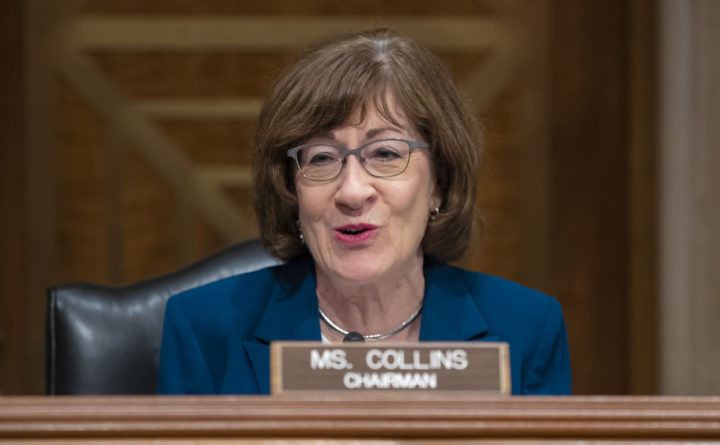
WASHINGTON — Democrats and liberal groups on Friday pointed to a Supreme Court ruling in an abortion case to argue that Justice Brett Kavanaugh would vote to overturn Roe v. Wade, focusing their ire on Sen. Susan Collins, a Maine Republican who supported Kavanaugh’s nomination last year and faces a tough 2020 re-election.
The outcry from the left follows the court’s 5-4 vote to block a restrictive Louisiana abortion law. The 2014 law, which has never been enforced, would effectively shutter most of the state’s abortion clinics by requiring physicians at those facilities to have admitting privileges at nearby hospitals.
While Democrats hailed the decision, they pointed to Kavanaugh’s dissent as a sign that he is poised to side with conservatives in future rulings on abortion rights.
In his dissent, Kavanaugh said there was a dispute about whether the physicians in the Louisiana case could obtain admitting privileges, and that a 45-day grace period would have provided time to settle that question.
Democrats are particularly incensed at Collins, who delivered a 44-minute-long floor speech in October declaring her support for Kavanaugh. At the time, Collins, who supports abortion rights, said she did not think Kavanaugh would vote to overturn the landmark 1973 Roe v. Wade ruling that legalized abortion.
Collins’ communications director, Annie Clark, said it was “clear that a lot of the critics of Justice Kavanaugh’s dissenting opinion haven’t even read it.”
“If the far left groups weren’t targeting Senator Collins for Justice Kavanaugh, they would be targeting her for something else,” Clark added.
Brian Fallon, director of Demand Justice, a liberal group that opposed the Kavanaugh nomination, said the group will launch a digital ad buy of more than $10,000 next week in Maine to inform voters of how Collins’ vote for Kavanaugh helped lead to the close call in Thursday’s ruling. He said coming Supreme Court cases that will be decided before the next election, on issues such as abortion, immigration and transgender troops, will provide more opportunities to make the Kavanaugh vote costly for Collins.
“These are all issues that we think will make Collins look like just another politician for having supported Kavanaugh,” Fallon said. “We will be able to say, ‘I told you so.’
“The Kavanaugh thing for her is going to be a very salient issue,” he said. “It might be the deciding issue in that race.”
The Democratic Senatorial Campaign Committee, Senate Democrats’ campaign arm, is also criticizing Collins for her vote in support of Kavanaugh.
“It’s hard to know what’s worse: misleading Mainers and Americans about a Supreme Court justice who just tried to make Roe v. Wade obsolete or raising hundreds of thousands of dollars off the vote,” DSCC communications director Lauren Passalacqua said in a statement. “Susan Collins keeps showing Maine families she’s not on their side and why she won’t be reelected if she runs.”
National abortion rights groups, including Planned Parenthood and NARAL, also drew attention to Kavanaugh’s dissent Friday, as did several Democratic senators. Sen. Patty Murray, D-Wash., argued that Kavanaugh “has started attacking Roe v. Wade from the bench.”
“That means women & men who believe women should have access to safe, legal abortion must stand up stronger than ever for women’s constitutionally protected health care rights,” Murray said in a tweet.
Collins’ office countered such criticism Friday by pointing out that Democrats responded with “near total silence” after Kavanaugh provided the decisive vote in Planned Parenthood’s favor in a December Supreme Court ruling.
“During his confirmation process, Planned Parenthood was Justice Kavanaugh’s number one opponent,” Clark said in a statement. “They went after him with everything that they had. And yet, when it came to a case involving them, he was able to put that aside and rule impartially and independently.”
Collins will make a firm decision on whether to run for re-election near the end of 2019, she said in a televised interview last month.
“I’m getting ready to run. But frankly, I just think it’s, it’s too early to make that kind of decision,” Collins said on NBC’s “Meet The Press.” “But I am getting prepared, and I’ll make a final decision towards the end of this year.”
Twenty-two Republican-held Senate seats are at stake in the 2020 election, and Collins is among the most vulnerable incumbents. She is one of only two Senate Republicans facing re-election who represent states won by Democrat Hillary Clinton in 2016; the other is Sen. Cory Gardner of Colorado.
But Collins has cultivated a bipartisan reputation in the state that will present a difficult challenge for Democrats. One Democrat who generated a stir in the fall was Susan Rice, who served as President Barack Obama’s national security adviser.
In an October tweet, Rice appeared to signal interest in running, before later making clear she did not have any announcement to make. Days after that, Rice said she would consider it after the midterm elections.
“The people of Maine have always appreciated Senator Collins’ diligent work ethic, her extraordinary command of federal issues, and her thoughtful and deliberative approach,” Clark said. “And that’s exactly how she’s going to continue to proceed.”
Washington Post writer Robert Barnes contributed to this report.
This article originally appeared on www.bangordailynews.com.







